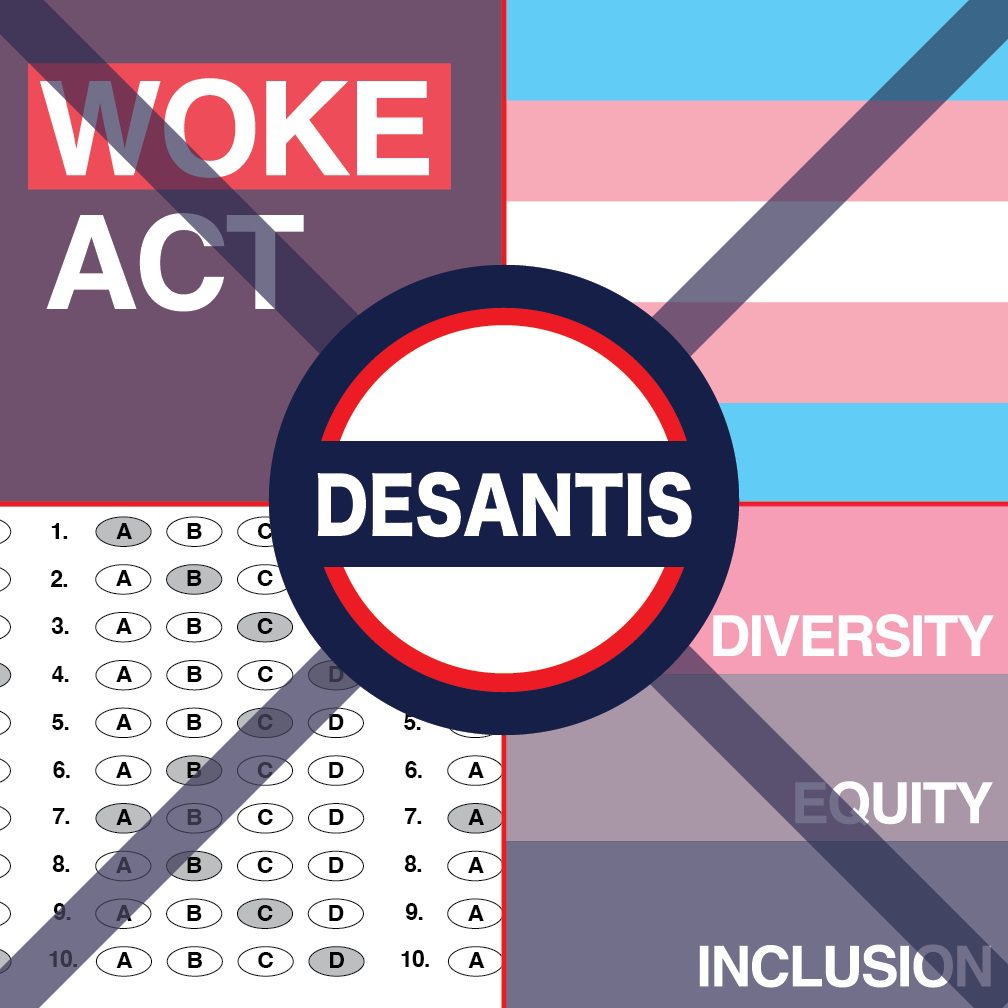Students should not be political collateral in DeSantis’ hunt for power
By UM Editorial Board
On March 1, 2023
*This piece contains opinions.

1,651 books were targeted by bans in 2022, according to The American Library Association, most of them related to African American or LGBTQ+ culture. More than 160 teachers have resigned or been fired in response to these bans and the wider, growing political movement against academic freedom spreading through Republican-led states.
Florida is at the center of this campaign. Under the supervision of Gov. Ron DeSantis, 566 books were banned across 21 Florida school districts in the 2021-2022 school year alone, according to PEN America’s Banned Book Index. DeSantis, a rising star among conservatives, has reignited the censorship battle in classrooms on his path to rid Florida education of “wokeness” and reform higher education to his standards.
With every banned book and lifelong educator fired, DeSantis further erodes the value of public higher education and jeopardizes its foundations as part of a political agenda that has intensified since he took office. Students, many of whom are still too young to vote in gubernatorial elections, will end up paying the price for these decisions.
In his latest moves to mold education to his personal tastes, DeSantis has taken a stance against the College Board, proposed cutting all diversity, equity and inclusion (DEI) funding at public universities and meddled in gender-affirming healthcare on college campuses. He has followed this up by systematically appointing conservative staff to key collegiate positions and installing his own civic education programs at several public colleges.
Each initiative encroaches on freedom of expression and speech in upper levels of education while acting as a direct threat to the accessibility of information and legitimacy of Florida’s academic institutions.
Since its beginnings in the early 19th century, public education in the U.S. has reflected a deal between taxpayers and the government to provide all children with a proper education that will prepare them for their democratic duties and the workforce. DeSantis has violated this agreement.
His changes to tax-payer funded universities do not reflect the opinion of most Floridians, nor are they in the interests of the many students who attend them. These are instead part of a self-interested media campaign targeted at an increasingly politically polarized nation.
In his efforts to pull voters and attention to the far-right, he is creating a hostile school environment for nearly half of his constituents. With more than 47% of Florida’s population identifying as members of a racial or ethnic minority, according to the 2020 U.S. Census Bureau, his efforts to remove DEI programs are an intentional effort to limit demographic diversity within universities.
As a private school, the University of Miami does not have to abide by many of these orders but that does not prevent their impacts from reaching our campus. Almost 35% of undergraduate students at UM are from Florida. They have friends and siblings attending the public schools DeSantis is targeting and former teachers who are facing threats for the books they use and the contents of their syllabi.
More importantly, UM students are residents of Florida, a state that no longer respects the entirety of their academic ambitions or the pillars of DEI: a state that would take away the teachings of critical race theory and prevent gender-affirming healthcare if they were able to.
In his proposals, bills and laws DeSantis has promised the citizens of Florida that he is liberating education.
“Governor Ron DeSantis announced legislation for the 2023 Session to further elevate civil discourse and intellectual freedom in higher education, further pushing back against the tactics of liberal elites who suppress free thought in the name of identity politics and indoctrination,” the governor’s staff said in a news release.
Yet, in response to the legal case against the Stop-WOKE act, Pernell v. Florida Board of Governors, state lawyers argued the opposite: that teachers and professors’ rights to freedom of speech are limited in a classroom setting.
“The conclusion that university professors do not have an individual right to academic freedom is obviously correct,” the defendants said in a court filing in September 2022.
They argue that the university itself limits this right to academic freedom. Thus, the authority for what is allowed to be taught in classrooms will come directly from universities’ administrations, many of which have been staffed through DeSantis appointments.
Ben Sasse, a DeSantis-approved and appointed former Republican senator from Nebraska, presides over the University of Florida, the highest-ranked public university in the state. After DeSantis forcibly removed and replaced six of 13 members of New College of Florida’s board of trustees, the trustees fired President Patricia Okker. They then replaced her with interim president Richard Corcoran, the 2016-2018 Republican speaker of the Florida House of Representatives, giving him a nearly $400,000 increase over Okker’s salary. Two presidents bought to ensure the DeSantis doctrines are enforced.
The governor’s hollow claims about intellectual freedom and the need for new leadership are an attempt to cover up financial and political support for other Republicans.
Intellectual freedom comes through free access to ideas from all points of view and the ability to draw one’s own conclusions, not through guiding the next generation into an echo chamber reflecting a singular way of thinking. Censorship and reformatting schools against African American and LGBTQ+ education will not make a better educated population but a more ignorant one.
There is nothing free about the education system DeSantis is creating.
This piece was republished from The Miami Hurricane.